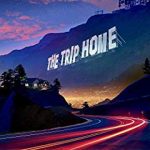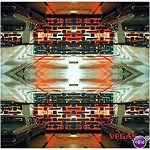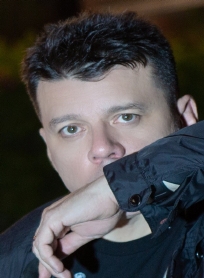The Crystal Method – originally made up of sonic adventurers Scott Kirkland and Ken Jordan – first made its mark on the electronica scene with the 1997 album Vegas, a classic of the genre which sold over one million copies in the US. This was followed by the 2001 album Tweekend, which incorporated rock elements into the mix, and had guest appearances by singer Scott Weiland from Stone Temple Pilots and guitarist Tom Morello from Rage Against the Machine.
More albums followed, the most recent being The Trip Home which came out in September and was the first Crystal Method album produced after the retirement of Mr. Jordan. But have no fear – Mr. Kirkland took the reins and produced a fine album with lots of danceable parts, a bit of open space, and some great retro synth sounds.
This interview was for a preview article for noozhawk.com for the show by The Crystal Method at EOS Lounge in Santa Barbara on 11/9/18. It was done by phone on 10/29/18. (Graham John Bell photo)
Jeff Moehlis: What can people look forward to at the upcoming show?
Scott Kirkland: I think that the people will be hoping to hear some Crystal Method music, and I’ll oblige with a big smile and a lot of enthusiasm. I’ll be playing lots of stuff from Vegas and Tweekend. I can promise that I’ll be enthusiastic and passionate about what I’m doing, and what I’m playing. If one walks into a Crystal Method show and sees the guy up onstage being passive and basically going through the motions, you’ve walked into the wrong room. I’m usually all in, and I luckily get this lovely adrenaline drop right before I go on.
I think people will have a great time listening to classic Crystal Method stuff, music that’s relevant to the history of the electronic scene, at least going back to the rave days of the early ’90’s. I’ll play a great set. I don’t mean to toot my own horn, but people spend a lot of money going out, they take the time to find a babysitter, they get their friends together and deal with all the different things that go with going out like parking and getting to the show. I just always want to make sure that everybody has a good time.

JM: You have a new album out, The Trip Home. Can you tell us a bit about how that album came together?
SK: It started really in earnest about six months after my partner Ken retired, back in spring of 2016. I just started going into the studio, which I bought him out of. We’re still great friends, and I’m very happy for the next step in his life moving forward, and retiring down in Costa Rica. I, on the other hand, am equally enthusiastic about the future of The Crystal Method, because I’m able to build on the twenty-plus years together, but now it’s my story to tell, it’s my narrative.
When things started to come together for The Trip Home, I started to realize that this was going to be sort of a cinematic interpretation of the twenty-plus years of the band, and the fight to become relevant, the fight to make it on those stages and on those gigs in the early days. “Holy Arp” is really the first track that brought me closer to The Trip Home, so I think that it represents the next stage, and the beginnings of where the band was in ’94, ’95. The next track is “Moment of Truth”, and that track represents those early events and clubs that Ken and I used to go to, specifically this great club in the early ’90’s called Truth, which took place at the Park Plaza Hotel in Downtown Los Angeles, a massive room of propulsive music with a visual light show to match.
Moving forward, “Ghost in the City” is a great collaboration with my friend Le Castle Vania and Amy Kirkpatrick that really is a wild ride, as one begins to realize that they’re no longer here, they’re no longer relevant, they’re no longer taking up the space that they felt that they had before. There’s sort of the journey of the different emotions on “Turbulence”, this massive aggressive high-roller track that wobbles out of the depths of some kind of volcanic eruption, then explodes into this explosive, punchy, groovy track that then gives way to the space.
To me, having a lot of space on the album was important. Not just open blank space, but more those moments where the listener can breathe a little bit, where the music breathes. It’s not just one massive sausage squeezed down a tube. This is a record that I think is anti-EDM in the sense that it doesn’t need to be the loudest kid on the block, and it doesn’t have to be the most aggressive. It’s just really there to tell a story, and let the listener plant their own story, and put their own story on top of it.
JM: Going way back, who or what were your main musical influences when you first started out with The Crystal Method?
SK: I was born in 1970, and my parents were pretty young when I was born, so I got a large dose of disco and progressive rock. My mom would listen to Donna Summer and KC and the Sunshine Band and bands like that, and my dad would be listening to Pink Floyd and Led Zeppelin and many, many other bands that were represented well in his vinyl collection. So I listened to all that.
Then I got into heavy metal and bands like Metallica and Motley Crue through the ’80’s, and then I discovered Depeche Mode and bands like New Order. I got into a little bit of the alternative bands like The Cult, Tears For Fears, and dabbled in The Cure and all that stuff. Then, I’ve always had a great appreciation for funk and traditional R&B, bands like Parliament.
To me, it’s about great songwriters. I think that’s kind of missing in a lot of music today. There’s so much music out there that’s really well done, that’s recorded really well and sung really well, but sometimes you can’t tell one artist from another, and I think they’re lacking in this ability to make you feel something rather than just begin full-on with the lyrics. So I appreciate all those artists that really had a voice that was unique.
Also a lot of the women from ’80’s and ’90’s – PJ Harvey and Pat Benatar and Joan Jett. Something I wanted to bring forward on this album was that strong female, motherly voice. Back in the day when my mom was working 40 hours a week, she was like Donna Summer working hard for her money [laughs]. I could always appreciate great women of rock and of soul. So this record is inspired by all those things.
I grew up surrounded by music all the time, and getting into the ’90’s bands like Orbital and Prodigy, and of course Chemical Brothers – we were kind of sprouting our buzz right around the same time as they were, when they were starting to grow in their respective parts of the world. We feel a kinship to them, and I greatly appreciated a lot of what they contributed to the scene, and specifically what they’ve inspired Ken and me to do over many years.

JM: I associate The Crystal Method most strongly with your first album Vegas, which is 21 years old now. Looking back on that, what are your reflections on that particular album?
SK: Over the years, we’d make a record, and the last thing we wanted to do was make the same record again. We were on the road for three or four years supporting Vegas, and we got back into the studio I just knew that I couldn’t do another [Roland TR-] 909 drum fill, and build an album that was similar to Vegas, because Vegas was special and unique and really captured those first two or three years of Ken and I working together as Crystal Method, and growing up in the scene.
In 1994, we were about as underground as you could get. The radio landscape was filled with grunge and alternative, and disco was dead, if you will. A lot of the rave scenes that started in the late-’80’s and early-’90’s were relegated to festivals, and maybe once or twice a year in your respective part of the world. But there wasn’t really a lot of attention being paid to that sort of music over in the United States. But Vegas was born in that little two-car garage in La Crescenta that was our studio which we custom built, called The Bomb Shelter. Going back and listening to the way that we recorded it, and some of the techniques, I’m fascinated with the whole album. I’m connected, obviously, to it, and have so many memories of making it. It’s like an athlete that maybe hits his goal, and then tries to figure out another goal to hit, because that athlete is no longer the same athlete that he was 21 years ago.
I think that the great thing about the way that we make music is that it really encompasses the time and place we are at at that moment. We take a lot of the things in, we go out and we’re part of the scene, and we’re inspired by others. So the album is one of those records I’ll always be fascinated with, because I’m so connected to it, but it’s a version of us at a different place and a different time. The outtakes from it were fascinating as well.
And the process – we didn’t have the kind of technology that we have nowadays. So if you were going to do something, you had to follow it through. We didn’t have the recallability like nowadays, where every song can be brought up exactly as it was the last time you left it. For us, most of Vegas was made with synthesizers that were sync’d with MIDI, and those settings on those synthesizers would be affected if you went away from it. And then the settings on the board, the way we had things plugged in, and the routing that we had to deal with in those days – you know, you had to finish the song and you had to move forward. Even now that I look back at it, I can’t pull up a session exactly how it was back then, because so much of it was on a board, and settings that were part of a routing that you just can’t recall. But I love it. I hadn’t listened to it from beginning to end in quite some time, and I sat with some friends and listened to it back and it was a great deal of fun.
JM: What advice would you give to an aspiring musician?
SK: I would say to just find your sound, find your purpose. It’s easy nowadays, especially in the world of electronic music, to hear a song and say, “I want to be like that song”, or “I want to create a beat like that.” But really, the sound that’s going to make you stand apart is something that is really inspired by all the stuff that brought you to where you were, not necessarily just some track that you hear on the radio. So find your sound, and then just hustle. Work at it. Make every effort to take advantage of every opportunity that you have in front of you, and grind it out. You never let disappointment spoil the fun.
JM: You have a new album out and you’re doing a tour right now. What’s next? Do you have any other projects in the works?
SK: I’ve got a pretty good start on my next album, which will be called The Trip Out, which I look forward to releasing next year. And then, also around this time next year I’m looking to have a live show that can go out which combines all those different albums and all those different eras together in a cohesive live set. That’s something I’m looking forward to. Then in 2020, maybe I’ll do some festival stuff, and then maybe do some scoring. I just scored a theme for a TV series, and I’m always looking forward to any challenge that keeps me hungry and allows me to learn a little bit more.


Discussion
No comments for “Interview: Scott Kirkland”